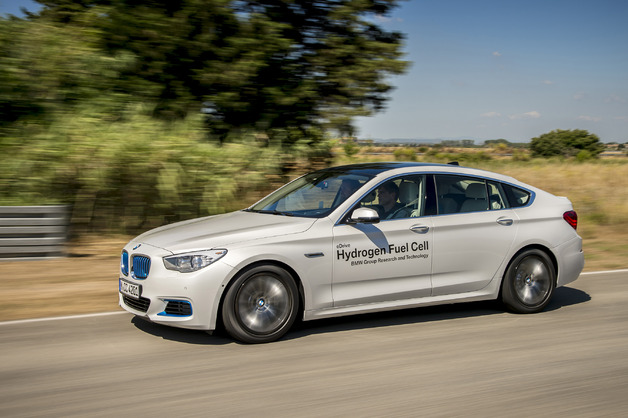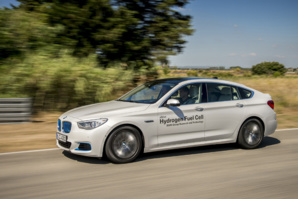Dailycsr.com – 03 July 2015 – The automakers in Germany are promoting the “clean-car” offer, following the “rolling out” of the i3 in 2013 which was powered by battery. This time BMW will hit the public roads for the first time in a test drive which will be powered by “hydrogen fuel cells”. This event is likely to take place sometimes during this month itself.
The said test will be developed into crafting “a technically mature” vehicle which will mostly be ready for the customers to use after the year of 2020. This information was passed on to reporters by the “powertrain research” head, Matthias Klietz, when he was present at one of BMW’s “test track”, situated in France’s Miramas. Furthermore, he commented that:
“By around 2025 to 2030, we expect fuel cell cars to have an established presence, but there are challenges that remain, like building the refueling infrastructure.”
In order to develop the “fuel cells” the company of BMW has shook hands with the company of “Toyota Motor Corp.” Whereby a prototype of a “5-Series Gran Turismo”, using “joint technologies” of both the partner companies, was demonstrated at the test drive ground of Miramas, on Wednesday, reports Bloomsberg.
Given the present scenario, wherein the world is becoming more and more conscious of pollution emissions, the company of BMW is set to improve the technology of fuel usage by creating “alternative powering setups”. Consequently, the company has invested in a “multibillion-dollar” project, whereby the demonstration of the car powered by “hydrogen fuel cells” was a working model. The idea of utilising the element hydrogen as a fuel stemmed from studying the functioning of spacecrafts.
Since the year of 1960s, spacecrafts have been producing electricity from the reaction of “hydrogen with air”. In fact, the hydrogen powered batteries last longer and emit only “water vapour”. However, among certain enlisted disadvantages to this technology, there is a high manufacturing cost as the metals used to fabricate the car are quite costly. Moreover, at present, there are few “service stations” who can replenish the car with “the hydrogen gas”.
Likewise, BMW is in the process of discussing the possibilities of speeding up the process of creating “refuelling network”, while consedering the viabilities of the said technology with various carmakers in consultation with the government. Many branded car manufacturing companies urged in unison for contributions so as to raise sufficient funds which will enable “a hydrogen-fueling network” across countries.
During the test drive, “the Gran Turismo’s performance equalled that of any existing electric car except a noticeable “hissing sound” was generated from the pump which channelled air and hydrogen “through the fuel cells” only when there were sudden acceleration. The Gran Turismo takes only five minutes to fill its tank and has a capacity of “500 kilometer” range; although the performance rate may drop after refuelling.
While commenting on the technical aspect of the test model, Ruecker said:
“Technically, we’re ready to put fuel-cell cars on the road, but so far it remains too expensive. Making fuel-cell technology a reality is a task not just for carmakers, but for the whole of society.”
References:
http://www.bloomberg.com/news/articles/2015-07-01/bmw-s-first-fuel-cell-car-starts-testing-in-clean-engine-push
The said test will be developed into crafting “a technically mature” vehicle which will mostly be ready for the customers to use after the year of 2020. This information was passed on to reporters by the “powertrain research” head, Matthias Klietz, when he was present at one of BMW’s “test track”, situated in France’s Miramas. Furthermore, he commented that:
“By around 2025 to 2030, we expect fuel cell cars to have an established presence, but there are challenges that remain, like building the refueling infrastructure.”
In order to develop the “fuel cells” the company of BMW has shook hands with the company of “Toyota Motor Corp.” Whereby a prototype of a “5-Series Gran Turismo”, using “joint technologies” of both the partner companies, was demonstrated at the test drive ground of Miramas, on Wednesday, reports Bloomsberg.
Given the present scenario, wherein the world is becoming more and more conscious of pollution emissions, the company of BMW is set to improve the technology of fuel usage by creating “alternative powering setups”. Consequently, the company has invested in a “multibillion-dollar” project, whereby the demonstration of the car powered by “hydrogen fuel cells” was a working model. The idea of utilising the element hydrogen as a fuel stemmed from studying the functioning of spacecrafts.
Since the year of 1960s, spacecrafts have been producing electricity from the reaction of “hydrogen with air”. In fact, the hydrogen powered batteries last longer and emit only “water vapour”. However, among certain enlisted disadvantages to this technology, there is a high manufacturing cost as the metals used to fabricate the car are quite costly. Moreover, at present, there are few “service stations” who can replenish the car with “the hydrogen gas”.
Likewise, BMW is in the process of discussing the possibilities of speeding up the process of creating “refuelling network”, while consedering the viabilities of the said technology with various carmakers in consultation with the government. Many branded car manufacturing companies urged in unison for contributions so as to raise sufficient funds which will enable “a hydrogen-fueling network” across countries.
During the test drive, “the Gran Turismo’s performance equalled that of any existing electric car except a noticeable “hissing sound” was generated from the pump which channelled air and hydrogen “through the fuel cells” only when there were sudden acceleration. The Gran Turismo takes only five minutes to fill its tank and has a capacity of “500 kilometer” range; although the performance rate may drop after refuelling.
While commenting on the technical aspect of the test model, Ruecker said:
“Technically, we’re ready to put fuel-cell cars on the road, but so far it remains too expensive. Making fuel-cell technology a reality is a task not just for carmakers, but for the whole of society.”
References:
http://www.bloomberg.com/news/articles/2015-07-01/bmw-s-first-fuel-cell-car-starts-testing-in-clean-engine-push


 Gran Turismo To Emit Water Vapour Instead Of CO₂
Gran Turismo To Emit Water Vapour Instead Of CO₂





 Companies
Companies